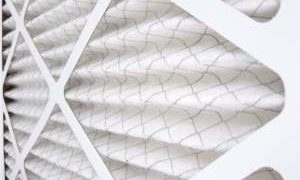Choosing the Right HVAC Air Filter
Feb 15, 2015

Choosing the right air filter and changing it at appropriate intervals is one of the most important things you can do to get trouble-free efficient service from your HVAC system while maintaining good air quality inside your home. The type of filter that’s right for your system depends on several factors that balance the need for energy efficiency with your family’s unique health requirements.
What Air Filters Do
The primary purpose of air filters in heating and cooling systems is to keep the air handling equipment clean. Good indoor air quality is only a secondary benefit of using the right air filters.
An air filter collects dust, pet hair and other debris from the incoming air inside return ducts before it passes over the blower fan and motor in the furnace or air conditioner. Clean motors and fan blades require less maintenance and last longer than moving parts that accumulate dust and dirt from unfiltered air.
Depending on the type of filter you choose, the air filter can have a big impact on your indoor air quality by removing a large portion of the dust mites, pollen, mold spores, tobacco smoke and other pollutants that may be present inside your home and get sucked into the ductwork via the return vents.
Air Filter Efficiency Ratings
Manufacturers use the minimum efficiency reporting value, or MERV rating, to measure the effectiveness of air filters at removing tiny particles from the air passing through them. The MERV scale goes from 1 to 16, with 1 being the least effective and 16 being the most effective. Very few home HVAC systems require air filters with MERV ratings higher than 12. Filters with the highest ratings are used in specialized circumstances such as hospital operating rooms.
The MERV ratings are based on the size of particles that a filter collects. Filters in the MERV 1 to 4 range collect particles larger than 10 micrometers in diameter while letting smaller particles pass through. These filters are adequate for the basic task of keeping debris out of the HVAC air handler, since they will stop things like carpet fibers, pet hair, dust mites and pollen from passing through.
Filters with MERV ratings between 5 and 12 collect particles as small as 1 micrometer, including mold spores, dust mite debris and pet dander. These filters are very effective at improving indoor air quality and are suitable for most homes with residents who are sensitive to common allergens.
Filter rated between MERV 13 and MERV 16 remove particles as small as 0.3 micrometers, including bacteria and smoke. These filters are rarely used in home HVAC systems because of the high pressure drop they create upstream of the air handler.
Choosing the Right Filter
There’s a trade-off between energy efficiency and air cleaning effectiveness that you need to consider when you choose the right air filters for your HVAC system. Lower-rated filters do not restrict airflow as much as higher-rated filters, so your system will run at a higher energy efficiency with a lower-rated filter. Lower-rated filters are much cheaper than more efficient filters, so you need to take ongoing maintenance costs into account when choosing your filter.
If your family has health issues that can be improved with higher indoor air quality, choosing a filter with a mid-range MERV rating is a good idea. These filters will take most allergens out of the air going through the ductwork without causing an unacceptable pressure drop and corresponding loss of energy efficiency in your HVAC system.
Change the Air Filter Regularly
Changing the air filter on a regular schedule is important for several reasons. A clogged filter puts unnecessary strain on the air handler as it works to maintain the correct airflow in the ductwork, resulting in lower energy efficiency and shorter equipment life. A dirty filter is also less effective at maintaining good air quality inside your home, so family members who are sensitive to dust, pollen and other allergens benefit from regular filter changes.
Many manufacturers recommend that you change the air filter every three months, but how frequently you need to change yours depends on your home’s unique circumstances. If you use higher-MERV filters, they will need to be changed more frequently than inexpensive low-rated filters. Living on a dirt road or having indoor pets are factors that might dictate more frequent filter changes.
Call us today at JD’s Air Conditioning for help choosing the right air filters for your home in the Longview area.
